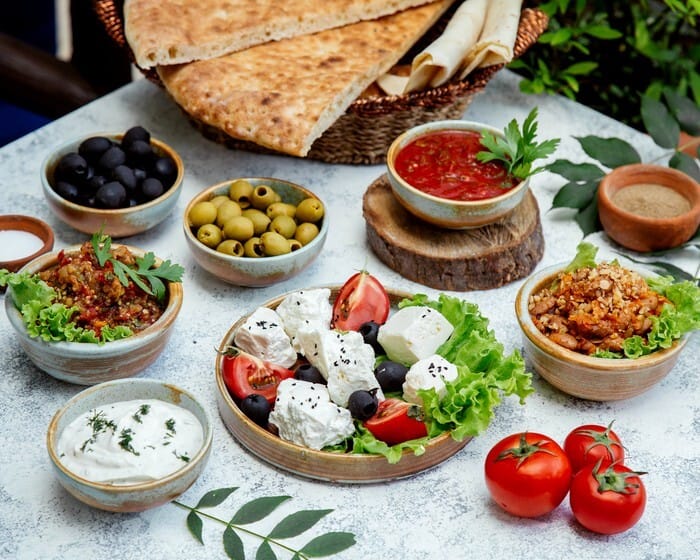- ibn e aadam
- Posts
- Mediterranean Diet: A Dummy’s Guide
Mediterranean Diet: A Dummy’s Guide
Hey everyone, hope your mind's been kind to you lately 😄
Here’s some useful reads to keep you sharp!
Mediterranean Diet: A Dummy’s Guide
Lagom Picks ☕
From Girlboss to Homemaker: Who’s Happier?
Mediterranean Diet: A Dummy’s Guide

The Mediterranean diet was born thousands of years ago along the shores of the Mediterranean Sea — where olives, grapes, and wheat grew almost effortlessly.
A quick history:
The ancient Egyptians, Greeks, and Romans built their meals around bread, olive oil, vegetables, cheese, and fish.
Over time, new flavors arrived. Arab traders brought rice, citrus, eggplant, and spices in the Middle Ages.
The discovery of the Americas added tomatoes, potatoes, corn, and peppers. Tomatoes, once an exotic curiosity, became a symbol of Mediterranean cooking.
Today, the Mediterranean diet is one of the most respected and research-backed eating patterns in the world — celebrated for its ability to protect the heart, nourish the brain, and support long, healthy lives.
It’s built on:
🍅 Tomatoes: Rich in lycopene, a nutrient linked to better heart and brain health.
🍈 Olive oil: Contains a natural compound that works a bit like ibuprofen to reduce inflammation.
🥛 Fermented foods: Yogurt, kefir, and sauerkraut help grow healthy gut bacteria, which support digestion and immunity.
🥬 Greens & beans: Eating about 2½ cups of leafy greens each day can dramatically lower signs of inflammation in just months.
🐠 Fatty fish: Loaded with omega-3 fats that support heart and brain function.
🍓 Fruits & berries: Packed with natural compounds that help cool down inflammation in the body.
The diet works so well for one key reason: It helps calm inflammation, which happens when your body’s defense system stays active for too long and quietly harms healthy tissues.
Over time, the Mediterranean diet can lower the risk of heart disease, dementia, cancer, and Type 2 diabetes.
Lagom Picks ☕
Cold plunges (sitting in near-freezing water) have become a popular wellness trend, with many believing they speed up muscle recovery and improve overall health. However, new research suggests they might actually slow muscle repair by reducing blood flow to recovering tissues.
Helsinki has introduced The Doggy Route to Happiness, a sightseeing tour designed especially for dogs — complete with playful attractions like a monument made of sticks, a seaside café for pups, and even an entire island where they can run, swim, and explore.
From Girlboss to Homemaker: Who’s Happier?

The “girlboss” used to be everywhere — hustling, climbing, building her personal brand. Career was the priority, and the grind was worn like a badge of honor.
Now, many young women are stepping away from that lifestyle and choosing slower, home-centered lives instead. For them, success looks like a thriving garden, a fresh loaf of bread, or long afternoons with family.
So who’s happier? The career-driven liberal or the home-focused conservative? Here’s what the numbers say:
👉 37% of young conservative women say they are “completely satisfied” with their lives, compared to just 12% of young liberal women.
👉 Liberal women are almost 3x more likely to feel lonely than conservative women.
👉 Nearly 50% of young liberals said they’ve been diagnosed with a mental disorder, compared to just over 20% of young conservatives.
Why the gap? Researchers point to three big factors:
Marriage. Built-in companionship, emotional support, and shared responsibilities can make life feel more secure and less lonely.
Religion. Offers a sense of purpose, regular contact with a supportive community, and hope during tough times.
Social connectedness. Being part of a tight-knit family means having people to celebrate with, rely on, and lean on when life gets hard.
Of course, not every conservative woman is happy or every liberal woman is sad.
But there’s a lesson to be learnt here: happiness has nothing to do with being conservative or liberal.
It’s all about having strong personal connections, stable commitments, and a shared sense of purpose to help you get through the day.
AD BREAK
The best HR advice comes from people who’ve been in the trenches.
That’s what this newsletter delivers.
I Hate it Here is your insider’s guide to surviving and thriving in HR, from someone who’s been there. It’s not about theory or buzzwords — it’s about practical, real-world advice for navigating everything from tricky managers to messy policies.
Every newsletter is written by Hebba Youssef — a Chief People Officer who’s seen it all and is here to share what actually works (and what doesn’t). We’re talking real talk, real strategies, and real support — all with a side of humor to keep you sane.
Because HR shouldn’t feel like a thankless job. And you shouldn’t feel alone in it.
Quick question before you go...Enjoyed the edition? Your feedback helps us improve this newsletter. 🐦🔥 |


Reply